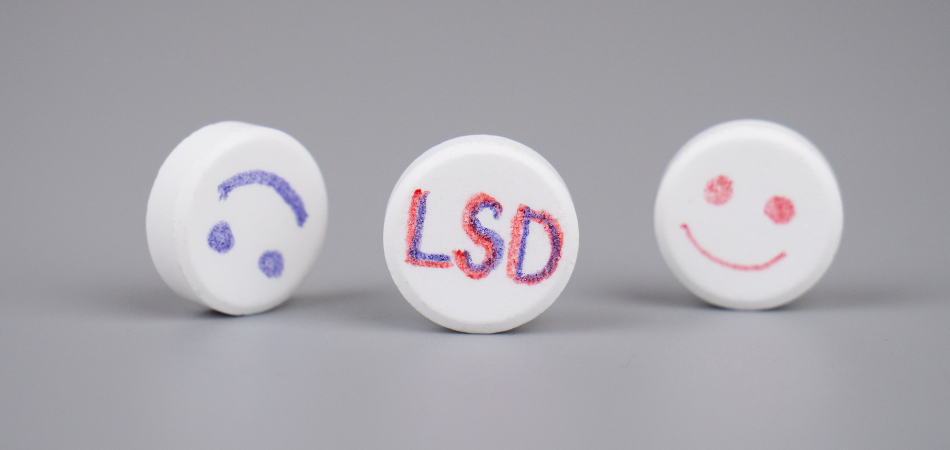Hallucinogens addiction
Hallucinogens are powerful psychoactive drugs that have shown a strong tendency to induce dependence and addiction, with severe consequences for both physical and mental health. Historically hallucinogens were used for religious rituals and medicinal treatments, however, this changed in the 60s when people started to use these drugs recreationally. Since then, hallucinogens have increased in popularity, and unfortunately cases of hallucinogen addiction continue to rise.
If you are stuck in a vicious cycle of hallucinogen abuse, help is available. Liberty House can help you to overcome your need for hallucinogens and start fresh.

What are hallucinogens?
Hallucinogens are a class of drugs that cause users to experience changes in perception, mood and consciousness. Hallucinogens include both natural and synthetic drugs and are typically grouped into three categories:
- Psychedelics: invoke an altered state of consciousness, often leading to seemingly profound thought patterns.
- Dissociates: cause you to feel detached from the things around you or your own self.
- Deliriants: can produce a state of confusion, loss of control and delirium which is often unpleasant.
These powerful drugs can affect the way a person thinks, feels, or perceives the world around them. Although they may be used for medical purposes under certain circumstances, these drugs generally have significant side effects and can be dangerous if they are used recreationally.
Are hallucinogens addictive?
The frequent use of psychedelic and dissociative hallucinations is much more likely to lead to addiction due to changes in brain chemistry and the levels of feel-good neurotransmitters. People who use these drugs repeatedly may feel as though they cannot function without them and thus go to great lengths to continue using these substances. Ultimately, the need to maintain equilibrium in our neurotransmitter levels may play an important role in why these types of drugs hold such a strong, dangerous allure for many people.
Hallucinogens refer to a broad range of substances, with each impacting the brain in slightly different ways. Psychedelic hallucinogens, such as LSD, psilocybin and DMT, work by impacting the prefrontal cortex of the brain – an area associated with mood, cognition and perception. They trigger a rush of the neurotransmitter serotonin and this affects physiological processes in the brain, leading to a disruption in how you perceive your surroundings.
Dissociative hallucinogens, including drugs like PCP and ketamine, interfere with the neurotransmitter glutamate. This neurotransmitter plays an important role in cognitive function, emotions and our perception of pain.
Deliriant hallucinogens, on the other hand, directly influence acetylcholine – another neurotransmitter that affects nerve impulses within the central nervous system. Deliriants are less likely to lead to addiction because the resulting effects can be distressing.
Signs and symptoms of hallucinogen use
Hallucinogens is an umbrella term referring to a broad range of drugs. As such, the signs and symptoms of hallucinogen use can vary depending on the specific drug in question, as well as on the user’s individual physiology and reaction to the drug. Generally, however, some common symptoms may include:
- Fluctuations in sensory perception
- Distorted sense of time and space
- Abnormal or heightened sensations and emotions
- Dissociative state
- Synaesthesia (blending of the senses, for example “seeing” sounds)
- Intense fascination with everyday items
- Seeing, hearing or speaking to things that aren’t really there
- Changes in appetite or sleep patterns
- Fatigue or restlessness
- Anxiety and panic attacks
- Impaired coordination and reflexes
- Slowed or slurred speech
- Manic laughter
- Inhibited ability to feel pain

If you have noticed these signs and symptoms in yourself or a loved one, it is important to seek professional help as soon as possible. It is never too early or too late to start your journey to recovery.
The risks of hallucinogen addiction
Taking hallucinogens poses significant risks to both your physical and mental health. Perhaps the most common danger associated with these drugs is an altered perception of reality which can place you at risk of injury or even death in some cases. This, coupled with a slowing of reflexes, is a concoction for disaster.
Losing touch with reality and seeing or hearing things that are not there can be extremely distressing, causing feelings of paranoia, agitation, panic and even episodes of psychosis and violence. Hallucinogens are extremely unpredictable, meaning that even if you experienced a ‘good trip’ once, the next one might not be as pleasant.
Dissociative hallucinogens also present dangers of overdose, especially when they have been consumed along with other substances like alcohol or benzodiazepines. Mixing dissociative hallucinogens with depressants can result in dangerous symptoms including seizures, coma and even death.
Prolonged use of hallucinogens can cause long-term damage to your health and well-being, including psychological issues, problems with memory, speech difficulties and impaired cognitive function. In severe cases, users may be subjected to continued episodes of hallucinations for months or even years after the drug has worn off. This is known as hallucinogen persisting perception disorder (HPPD).
Hallucinogen detox and withdrawal
Hallucinogen detox refers to the natural process of expelling substances from your bodily systems. This is the first stage of recovery, with the goal being to adjust back to normal life and heal after a period of intense drug use.
During the detox process, and depending on the type of hallucinogen consumed, you may experience some uncomfortable withdrawal symptoms. Some of these may include:
- Fluctuating temperature
- Sweating
- Headaches
- Nausea and vomiting
- Agitation and mood swings
- Stiff, spasming or aching muscles
- Slow, shallow breathing
- Elevated heart rate and blood pressure
- Anxiety or depression
- Suicidal ideations
- Psychosis
- Seizures

It is important to note that withdrawal is not the same as a “comedown”. Anyone can experience a “comedown” period of fatigue, nausea and disrupted sleep patterns after consuming hallucinogens, even after one use. Withdrawal, however, is the result of a chemical dependence on the drug and occurs as your brain tries to catch up and readjust to a life without hallucinogens.
Do I need hallucinogen rehab?
Knowing when to seek help for hallucinogen misuse can be tricky – there is even a common misconception that rehab is not required at all for this category of drugs. However, just like any other drug addiction, a heavy reliance on hallucinogens can damage your physical and mental health, relationships, work and finances.
If you are unsure whether your hallucinogen use warrants rehab treatment, take a look at the following statements to see if any may apply to you:
- I compulsively seek out hallucinogens despite being aware of the negative consequences.
- I have lost interest in previously enjoyed hobbies and focus all of my attention on procuring and taking hallucinogens.
- I need to use increasingly higher doses of hallucinogens to feel the same high.
- I have experienced problems at work or school as a result of my hallucinogen use, including being absent or having difficulties concentrating or completing tasks.
- My friends and family have voiced their concerns about my hallucinogen use.
- I rely on hallucinogens just to feel ‘normal’ or turn to them in order to feel happy.
- I experience persistent, uncontrollable urges to take hallucinogens.
- I have tried to stop taking hallucinogens in the past, but failed.
If even one of these statements rang true for you, hallucinogen rehab could be the turning point you need to get clean and transform your life. Don’t let your drug abuse continue to spiral out of control – you can take back the reins today.
Hallucinogens addictions treated at Liberty House
Liberty House is an experienced rehab facility with the means to treat a wide variety of substance abuse disorders and co-occurring mental health issues. We offer a therapeutic and peaceful environment in which to recover, with a friendly and knowledgeable team on hand to guide you every step of the way.
Some of the hallucinogens addictions we commonly treat include:
Cannabis addiction
Cannabis, commonly known as marijuana, is a psychoactive drug that has both hallucinogenic and addictive properties. The active chemical compound in cannabis, THC, has been shown to cause changes in your sensory perception and distort time.
Ketamine addiction
When used recreationally, ketamine places users at risk for dangerous behaviours and adverse side effects. This drug works by rapidly disrupting chemical signalling pathways within the brain, leading to a state of intense detachment and sensory distortion.
LSD addiction
LSD, or lysergic acid diethylamide, is a powerful hallucinogen that can cause dramatic and unpredictable changes in a person’s perception of reality. The effects may alter perception of sight and sound, resulting in vivid hallucinations and changes to sensory input.
DMT addiction
DMT can induce feelings of euphoria, intense visual hallucinations and altered states of consciousness. Because it acts quickly and lasts for a relatively short duration, DMT is often considered one of the most powerful hallucinogens on the market.
PCP addiction
PCP, or phencyclidine, is a hallucinogen that can cause a range of adverse physical and psychological symptoms. When used in high doses or over long periods of time, addiction can quickly take hold alongside paranoia, loss of coordination and reduced cognitive function.
Psilocybin addiction
Psilocybin, commonly referred to as magic mushrooms, causes dramatic changes in thought and perception with users often experiencing vivid visual or auditory hallucinations. Those who are prone to addiction can quickly develop an unhealthy dependence on this drug.
Frequently asked questions
Some of the therapies you will have access to include:
-
- Dialectical behaviour therapy (DBT)
- 12-step programme
- Group therapy
- Therapeutic community
- Family therapy
- Relapse prevention
- Gong baths
- Yoga and meditation
- Art therapy
- Sound therapy
During this time, you will learn valuable techniques for managing stress and preventing relapse when you return home, addressing the root causes of your hallucinogens use and any co-occurring mental health disorders. Without this, it is easy to fall back into the same patterns of behaviour that led you to rehab.
To ensure an ongoing successful recovery, it is important to continue to practise the skills and coping mechanisms learned in rehab after you return home. This can include attending support groups and aftercare, working with a therapist or counsellor, joining an exercise programme or hobby group and making healthy lifestyle choices.
Additionally, it is essential to stay connected with loved ones to maintain ongoing support and accountability. By focusing on these essential elements of recovery, you will be well on your way to achieving a successful and sustainable recovery from hallucinogens addiction.
- Type 1: random, brief flashbacks
- Type 2: long-term, disturbing and pervasive visual hallucinations
If you think that you may be suffering from HPPD, it is important to speak to your doctor who can help you to manage your symptoms.






